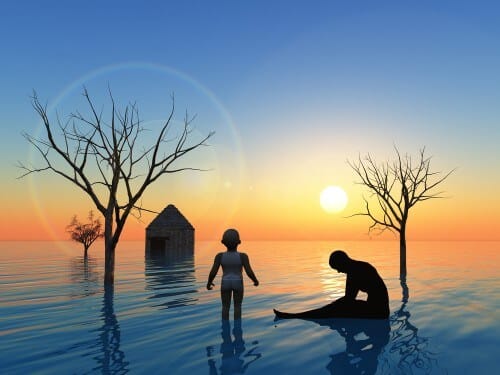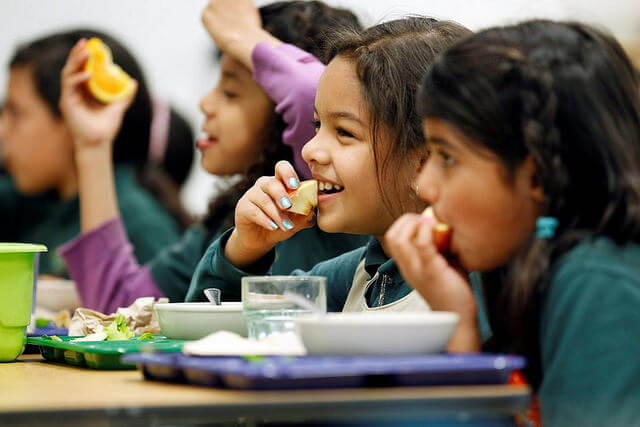A new report warns that climate change is the biggest threat to global health in the 21st century, and those most likely to be affected are children. Why exactly are they more exposed to the health risks, and what can be done to reduce the damage?

By: Maya Falah, Zovit - Science and Environment News Agency
The occurrence of climate change is no longer a matter of question or opinion; Today there is absolute certainty that the earth is undergoing a warming process. The representatives of the countries of the world are gathered at the Paris conference on climate change, to discuss what can be done to delay and moderate the changes that are exciting us. When they sit around the discussion table, it is desirable that our leaders take into account the effects that climate change may have on our health, and even more so on the health of children.
A report published last June In the medical weekly "The Lancet" on health and climate change defines these changes as nothing less than "the greatest threat of the 21st century to global health". The report states that they constitute no less than a medical emergency, and to date their effects on the health of the human race have been underestimated.
The authors of the report point to various problems caused by climate change and global warming, including direct effects such as an increased risk of heart attacks due to heat waves (which are expected to be hotter, longer and more frequent), outbreaks of infectious diseases due to a decrease in sanitation (which often occurs after extreme events such as storms and floods) and damage to the ability to supply food following events such as fires and droughts. Indirect effects stem from the necessity of uprooting settlements, and the lack of food and drinking water.
The children are more sensitive
These threats to our health become much more serious when it comes to children. In a policy statement published in the US A few weeks ago, the American Academy of Pediatrics warned that climate change is a particularly serious threat to children's health. Among the expected effects, the academy lists an increase in respiratory diseases due to increased air pollution and fire incidents, an increase in morbidity and mortality in children due to heat stress, hypersensitivity to the spread of diseases and poor nutrition due to a lack of fresh food such as fruits and vegetables.
"There are several reasons why children are more sensitive than adults to changes, and the fact that it is more difficult for them to deal with them," explains Dr. Hagit Ulanovsky, an expert in health and environmental risk management. "First, from a physiological point of view, the surface area of children is much larger than that of adults in relation to their body volume, so they are much more sensitive than us to heat and cold and dehydration. Their metabolic system and immune system are still in the process of development, and are less efficient in regulation and protection.
"Another reason why they are at extra risk is that they behave differently from us; Children spend a lot of time outside the home, they are very active and on the move, but they don't pay attention to how they feel physically or are able to take care of themselves. They often don't make sure to drink when they're thirsty or stop and cool down when their bodies overheat. These things make them a very sensitive population to climate change."
reduce the change
It sounds pessimistic, but we may still have some influence on things - among other things, through the decisions that will be made at the Paris Climate Conference. In this way it will be possible to delay and reduce, even if not completely prevent, the climate change that will come upon us for the worse.
The recommendations in the publications mentioned above include the implementation of a policy that will be based on reducing the use of carbon-based fuels such as coal, oil and natural gas, and on encouraging the use of renewable energies to produce electricity - through which we can see a reduction in greenhouse gas emissions into the atmosphere, which are currently the main cause of global warming.
Other proposals that appear in the aforementioned publications are the promotion of a policy that will support green construction and smart urban planning, which will include many sidewalks and bike paths (which will also help reduce health problems such as obesity, heart disease and diabetes), increasing the amount of open spaces and shaded areas in cities, as well as allocating significant budgets to promote transportation convenient public They also suggest raising public awareness of the issue through public campaigns, and through exposing children to it in educational institutions.

Dust in the school
At the same time as these steps, we should not rest on our laurels and start preparing for the possibility that climate change - which we are already witnessing to a small degree today - will increase and intensify and become quite severe. "Already today we can and should change our behavior," says Ulanovski, "there must be an adaptation of the system to the fact that times have changed and that we are already exposed to more extreme events.
"In cases like the dust storm that was in September, or on days when there are reports of increased air pollution, school administrators should know that they should not take the children out to play outside during breaks, cancel sports lessons, etc. Today there is not enough awareness of this, and although the Ministry of EducationDefines procedures on the subject - Most of the time they are not really applied in the field and there is not enough awareness of them".
Ulanovsky notes that following the occurrence of extreme events, the food supply may also be affected: "The Ministry of Agriculture, for example, needs to know how to ensure the supply of fresh and healthy food even when unexpected events occur. It is enough to have a case of extreme heat combined with a virus that attacks the tomatoes, as happened here this year, so that there will be a shortage of them for a month. The October rains that fell this year are also not good for agriculture, because they arrived before sowing.
"Adults know how to manage without tomatoes for a month and eat substitutes, but with children it is more complicated, and since they are still developing, the lack of vitamins in them is much more significant and affects more quickly. Extreme weather events affect the ability to produce vegetables and fruits in good quantity and quality, and for such cases you need to prepare."
HML at the community center
The Ministry of Environmental Protection understands that climate change is already here and we must prepare for it, and they have already formulated a plan to deal with it. In other government ministries as well, such as the Ministry of Health and the Ministry of Agriculture, steps are already being taken to take action towards the changes, which the representatives of the ministries told about At a conference held last September.
"There are many steps that can be taken right now that are 'no regret' steps, i.e. ones that everyone benefits from," says Ulanovski. "By investing a little time and a little money, you can create immunity that will be good in any case of extreme events. These are measures whose cost will pay off in any case, especially in Israel where extreme events occur not only due to climate change. If there is a security incident in the summer that does not allow farmers in the western Negev to access their fields, sometimes this is enough to damage the agricultural output. So that preparing for emergency situations in any case cannot harm us, but only benefit us".
Another thing that Ulanovski offers is the building of community resilience: "It is possible to train people who will be responsible in a situation of crisis or an extreme event. They knew how to guide the community on how to behave when an emergency or unexpected event occurs. It is also possible to assign a room in the community center that will be used as a hospital in case of need.
"The price is not high, and this resilience can be used not only to prepare for climate change, but also to deal with emergency situations of any kind, and along the way to increase the community's sense of well-being," Olanovski concludes. "A more immune community is a healthier community, and a healthy community is a community of people who live better."

15 תגובות
Pretty
Life
I suggest doing an IQ test for the deniers and show them they are matched.
Oh, I forgot - the experiment has already been done 🙂
Miracles
Nostradamus and Raphael are identical twins
The thesardamus
Your responses are the same as those of Pravda and Izbastia. I understand that you grew up on Leonid Brezhnev's lap and your guru was Eduard Chernenko.
They have names - the Koch brothers or Koch
Have the sponsors changed? Well done for the creativity.
Maybe if the claims were valid and the evidence backed them up, there might not have been a need to change the name to "changing the weather"?
The transition to changing the weather is a purely strategic decision - because changing the weather is an indisputable fact (the ice age is one example, Mamondum Maximum in the seventeenth century is another example)
Which also proves that heat or cold with or without human intervention and the sins of man pollutes the world and angers mother earth who punishes in hell... sorry warming, flood and other nonsense
No, the lie was not exposed, only that the sponsors of the opponents exerted enough pressure to change the name to something more politically correct. The change is in one direction - warming and you can read it in the article because they are preparing for the effects of warming and not for the effects of other climate changes. The name is not important, and certainly does not change the reality.
In contrast to activated emitting fused.
Nostradamus is able to hear other arguments without cursing or being sent to a mental hospital.
He probably cares more about the truth than he cares about reinforcing a pre-ordered narrative
It's science!!!
The narrative is more important than the truth.
The lie of global warming was exposed so we moved to "climate change"
What happened Avi Blivski I thought (at least that's what you called me) that I was a "warming denier"?
Nostradamus
Your nonsense and lies again? Enough….
Nostradamus
So how come you're here?
There is no place for trolls
Nostradamus my son
I'm sorry but I have to hospitalize you
And the propaganda continues...
It's a shame, the site has become a pravda, what about the voice of thousands of scientists on the other hand?